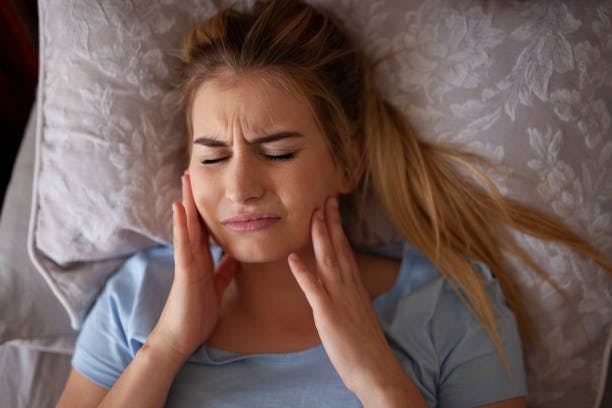Do you often wake up with a headache or jaw pain? You may be grinding your teeth at night without even realizing it. Teeth grinding can be a temporary reaction to stress or a chronic medical condition. Stay with us, we discover why we grind our teeth and how to overcome this bad habit.
What is teeth grinding?

Grinding of teeth or bruxism is a condition in which a person unconsciously grinds or grinds his teeth. Teeth grinding can be a response to stress or tension, and most often occurs during sleep. Frequent teeth grinding can cause pain in the jaw, head and neck, and can also permanently damage the teeth.
Why does teeth grinding occur?

The causes of clenching or grinding teeth can be numerous, and the most important thing is to recognize them and cure them in time. Some of the most common patterns are:
Stress. When under stress, our body produces cortisol, a hormone that makes us more alert and tense. The tendency for the muscles to spasm, including the jaw muscles. This can lead to unconscious teeth grinding, as well as other symptoms such as headaches, toothache and tooth sensitivity.
Irregular teeth. When the teeth are not properly aligned, it can lead to the upper and lower teeth rubbing against each other. This process causes the teeth to grind and eventually lead to tooth decay.
Improper bite. When we havecrooked teeth, this puts additional stress on the muscles and ligaments of the jaw, which can lead to pain, tightness, and grinding of the teeth in an attempt to relieve the tension.
Sleep disorders. When we don't sleep enough, the body doesn't get the rest it needs, so a person may grind their teeth in an effort to stay awake. This can lead to a vicious cycle, as the more a person grinds their teeth, the more likely they are to suffer from sleep disorders.
How to prevent teeth grinding in sleep?
There are several things you can do to prevent teeth grinding in your sleep:
Reduce your caffeine intake before bed. Caffeine contributes to muscle tension and therefore increases the likelihood that you will grind your teeth in your sleep. Opt for decaffeinated coffee or tea.
Avoid hard food: eating hard food right before bed can contribute to teeth grinding. Try to avoid eating hard candies, nuts or popcorn before bed.
Relax before going to bed. Try to relax, read a book, listen to nice music or take a warm bath to relax before bed. This can help reduce stress and anxiety that can lead to teeth grinding.
Establish a regular sleep schedule. A regular sleep schedule helps regulate the natural rhythm of sleep to reduce accumulated stress.
Talk to your dentist about a mouth guard: If you notice that you still grind your teeth at night, your dentist may recommend that you wear a mouth guard to protect your teeth from others dental problems, damage and pain.
Why does teeth grinding occur in children?

Grinding or clenching teeth is a common problem in children. It usually occurs as a side effect of teething. The process of teething can be unpleasant and painful, so grinding occurs as a child's instinctive attempt to alleviate the pain.
How to prevent teeth grinding?

Identify the moment when you clench your teeth and try to stop clenching at that moment.
Relax your jaw muscles by massaging them or holding a warm washcloth against them.
Exercise your jaw muscles by opening and closing your mouth slowly and regularly.
Wear a mouth guard at night if you clench your teeth while you sleep.
Avoid hard foods that require a lot of chewing.
Try to reduce stress in your life, which can be a key trigger for clenching and grinding your teeth.
Seek help from your dentist who will know which method of solving this dental problem is the most adequate for you.
What is dental abrasion and how does it occur?
Tooth abrasion is the loss of tooth enamel due to friction when grinding teeth. Tooth enamel is a hard outer layer that serves to protect the inside of the tooth. When the enamel is damaged, the inner layers become exposed and sensitive, whilethe gums become red, swollen and painful to hot and cold food or drinks.
How to treat bruxism?

If you are someone who struggles with bruxism or teeth grinding, your dentist may recommend one of the following treatment methods:
Practicing stress relief techniques. If stress is the trigger for your bruxism, learning how to relax can be very helpful.
Avoiding hard foods. Eating hard and dry foods can cause bruxism, so it's best to keep them to a minimum.
Jaw exercise. Performing exercises that strengthen and stretch the jaw muscles can help reduce bruxism.
Wearing protective mouth guards. A mouth guard can help protect teeth from disease caused by unconscious grinding and clenching.
If you suffer from bruxism, know that there is no reason to worry too much. Eliminate the cause and smile again perfectly, easily and without hesitation.










Share your opinion!
What do you think about this topic?
Comments (0)